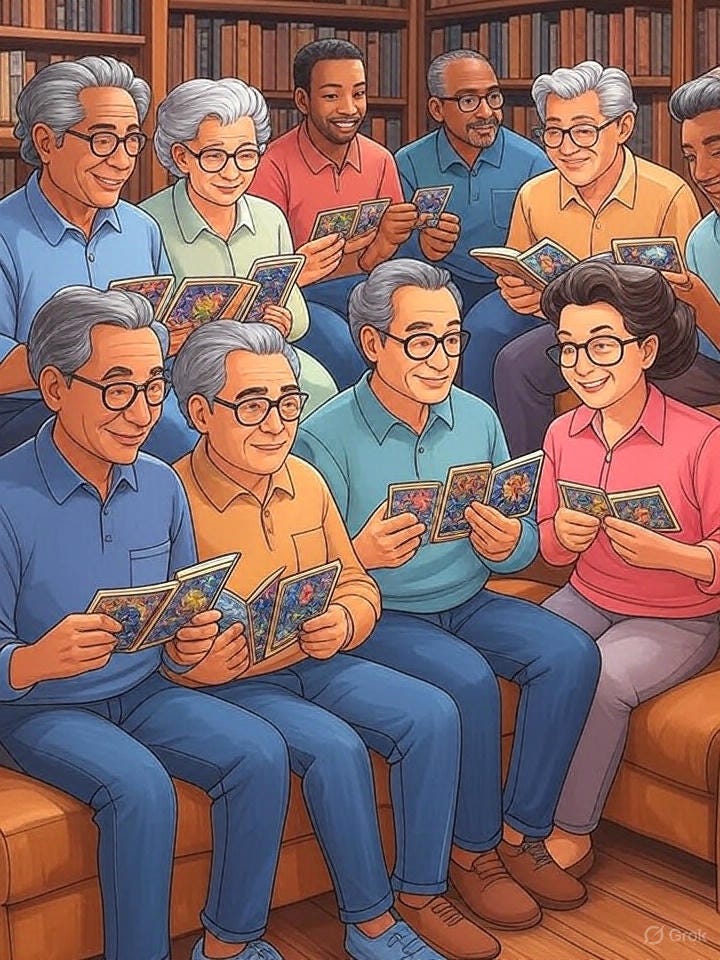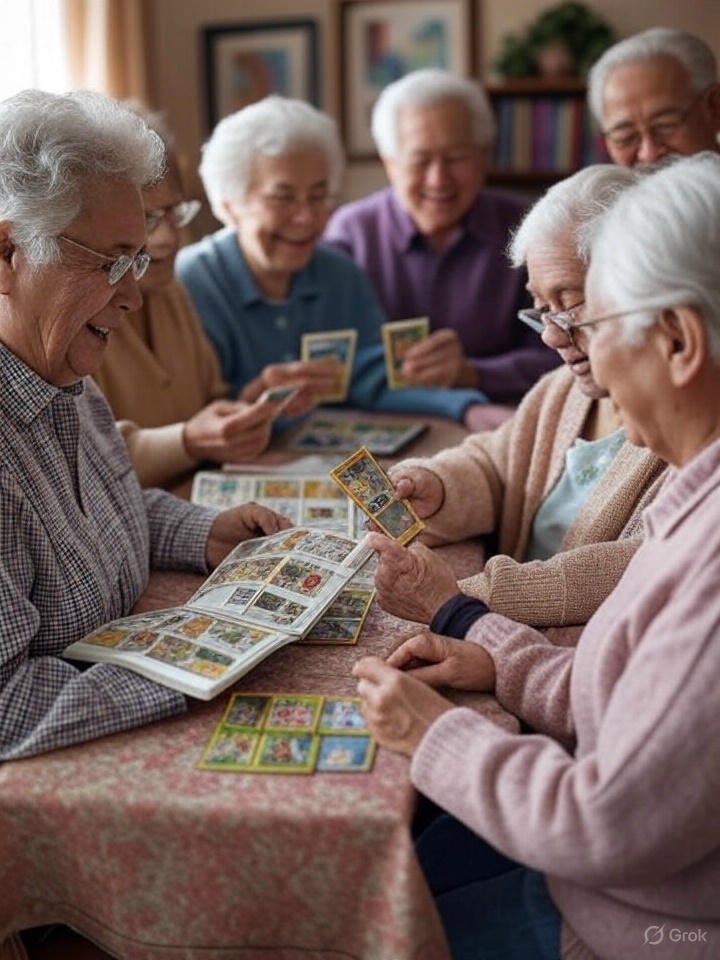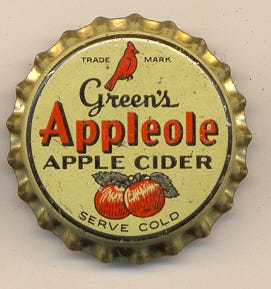
Nostalgia: the gift that keeps on giving... and taking
Share
Exactly like a perpetual motion generator, nostalgia is both the promise and the illusion
Nostalgia in the current pop-culture era is something seen as innocuous, like buying the Jawbreakers from the corner store as an adult because it’s what you bought when you were a kid. Nostalgia is talked about as if it is a good thing, because it is about inspiring a certain memory, and more importantly, the "good feeling" associated with that memory.
But is nostalgia actually a “good thing”?
First let’s designate the two nostalgia’s: there is a “cultural” sense of nostalgia, and a “socio-political” one.
Socio-politically, "nostalgia" refers to a feeling that life was better, long ago, in a simpler time. Like in a day before cell phones and streaming services, when you only had three channels on a turn-dial tv set, and phones were rotary-dial, and milk was delivered to your door-stop, you were somehow...less distracted? more focused on the day-to-day struggle for survival. Sure life was tough, but that's what made the experience of life "real".
Underlying this perception of a more real “real” is the sense that less-technologically advanced societies are living more in the moment…and underlying this perception is that with all the intelligence humans have, we have no answers to the Big Questions of Life—what it is, why we’re here…and that living in the moment, the here-and-now, ensures your brain is focused so much on survivin’ that thinking about the Big Questions is all but assured to be avoided. Which explains the fascination with uncontacted tribes in the world.

One cannot underestimate peoples’ ability—and willingness—to self-delude. Nevermind the “regret” in not living in a world of 3-channel television or cars with shocks so hard the bouncing could churn your grocery-bought cartons of milk into cream--how about internal plumbing and sanitation? Did you know without indoor toilets, waterborne diseases like cholera were major causes of death? Approximately in London alone in the late 1800’s, recurring cholera epidemics in the 1800s killed tens of thousands. Do people nostalgically yearn to live in those days? No doubt, some do.
The paradox is clear: people strive for answers to the Big Questions, which in itself leads to technological discoveries and advances which increase the chances of survival—and at the same time, despair at the lack of answers, and look backwards to a time when mere survival was the only answer to be had, and more importantly, all that was needed—foregoing any technological advancement beyond pointed spears and rock-hewn clubs. But it’s not like people are really going back to that way of life. It’s sort of like setting up the revolution meeting at the local Starbucks—people don’t really want to work for it, sacrifice anything, for the “better life”, if they don’t need to.
The important thing that can be teased out here is that there’s still some people that want it, wish for a “simpler” time—the wish itself is a symbolic gesture, an empty one for sure, but still there. But why? What meaning that is so attractive, lies there?
Already just by teasing out these various underlying conceptions, I’m starting to get the feeling that whatever bed nostalgia is built on, seems to smell similar to a bunch of BS. And where there’s BS, there’s the comforting blankie of illusion and self-deception—an attempt to assuage our fear of pain, and of death.
Maybe nostalgia is all bad
Therein lies the paradox of nostalgia: sure, nostalgia can be good, but maybe nostalgia can be bad too. And maybe nostalgia being “good” is in itself “bad”.
Maybe nostalgia in general is all bad.
Let’s tackle nostalgia-is-bad in the pop-culture aspect of it first, as the underlying sentiment is likely the same in both pop-culture and socio-economic-political spheres of Vitamin N for Nostalgia.
If you go to a comic book show lately (and comic-book store for that matter), you’ll notice that the comic book show is barely about comics. It’s now about “collectibles”. Pokemon, old comic books, coins, “fine art”, stamps, beer can labels…anything and everything can be a “collectible”.
The more interesting aspect is why people feel a need to buy something that is nowhere remotely related to finding a better way to grow food or build a house or skin a rat, and instead focus on something completely useless, based on the wispy ether-ness of “nostalgia”.
Let’s take a quick Large Language Module-look at the psychology of “collecting”:
Let’s play “AI Says”
“The psychology of collecting explores the diverse reasons why individuals acquire and maintain collections, ranging from intellectual satisfaction and social connections to emotional comfort and even coping mechanisms for anxiety or existential concerns. It's a complex phenomenon with both normal, healthy aspects and potentially problematic, obsessive tendencies that can range from a simple hobby to a mental disorder like hoarding.
Factors Contributing to the Urge to Collect:
-
Social Motivation:
Collecting can be a way to connect with others who share similar interests, fostering friendships and a sense of community, according to Psychology Today.
-
Intellectual Satisfaction:
The pursuit of knowledge, the thrill of the hunt, and the challenge of identifying and acquiring rare or unique items can be intellectually stimulating.
-
Emotional Comfort and Security:
Collections can provide a sense of order and control, offering a refuge from everyday uncertainties or a way to cope with personal anxieties.
-
Nostalgia and Connection to the Past:
Collectors may be drawn to items that evoke memories or connect them to a particular era or historical period.
-
Legacy and Inheritance:
Some collectors hope to preserve their collections and pass them on to future generations, creating a lasting legacy.
-
Personal Identity and Expression:
A collection can serve as a way for individuals to express their personality, interests, and values.
-
Underlying Psychological Needs:
In some cases, collecting may be a manifestation of deeper psychological needs, such as a need for control, security, or a sense of belonging.”
All of these factors can be collapsed under “Underlying psychological needs”.
No one would be collecting anything unless they got something out of it…unless it attained some kind of value, some kind of currency…and with anything that accrues value or currency, it can level up to the societal level of using it like a currency to exchange goods and services.
The human question is, how can a collectible attain value if it’s not connected in some way to our survival?
The obvious answer is: it very likely is.
Not sure if this term or phrase is coined yet or not, but what if there’s a thing called “psychological survival”, wherein we constantly “do” things that our brains interpret as “balancing” our mental state—wherein a “balanced” mental state is required for our actual survival?
Of course: what does “balancing” our mental state even mean?
Would nostalgia, and thus (as just one of many, many examples) the phenomenon of collecting 1920’s beer bottle caps from the MidWest, actually contribute to our “psychological survival”?
Tangent: Maybe we should shorten that phrase and make it more meme-y?
How about “psy-vival”?
Psy-vival
Now we’re getting into the nitty-gritty, because now we have to talk about what a “good” and “balanced” mental state is, and how doing this thing called “collectibles” helps with that.
Let’s hand-wave what a “good and balanced mental state” means exactly for now, and just accept that everyone knows what I’m referring to here (and it’s highly probable, because of the unknowability of the “Other”, that making any kind of theory of anyone’s mental state other than your own would be highly problematic and fallacious anyways).
At the very least, let’s state without a whole heck of evidence, that in the act of “collecting” is the theory that if we’re feeling anxious, on edge, or “chaotic”, collecting something helps with the anxiety…it keeps us off “the edge”…it brings comforting order to our minds.
Retrieving some long-forgotten memory tidbit from youth that the mere act of picking up a Pokemon card helps bring to the surface, seems to be the thing “of value” in nostalgia.
(In a weird way, what if collecting itself is the “collecting” of memory?)
That memory spark of an long-forgotten memory seems to add to the overall consistency of one’s internal ongoing story or narrative of who we are.
If we can know ourselves in the forever-remembering of our past forgotten incidents, perhaps we feel more ordered in maintaining that cohesive line of memory…and thus, our identity: “who” we “are”.
Kind of like bringing up from the lost depths of the sea, a memory-worm…squirming on the comic-book “hook”.
Nostalgia as the enemy of change
The bad thing about nostalgia is that it can represent the inability of the brain to let go of the past, and form new experiences and memories.
The argument here ostensibly is that our canned baked-bean brains can only contain so much bean-memories…they can only utilize the 4% of our brains that we do consciously use…to “hold onto” something that we don’t necessarily have to…but which we choose to do so anyways.
And it’s because of those parameters that we are less willing to try something new. Our internal paradox in this sense is that we both love order, and yet we need chaos. Chaos is required in order to build something new; indeed, order requires chaos to perpetuate and not stagnate.
The healthy dynamic of order and chaos gives rise to a natural state of the world that is born, lives, propagates, becomes redundant…and dies.
Another way of phrasing it is that human beings require order in order to stabilize, but also require chaos to keep things new once that stabilization corrupts and entropies into stagnation.
Nostalgia however seems to work against that dynamic; it is the zombie of this natural process, the metonymy of stagnation, the lurching, rotting remains of something long dead, sliming its way across a graveyard of old and long-forgotten memories.
Nostalgia: the memory addict
There’s a reason we stopped reading that comic, stopped playing that game, as we got older—it got boring. We dropped that thing, and over time that thing became a distant memory…until we “found” that “thing” again, and tried it on again, or played it again, or held it again…and the old memories of that “thing” came back, making yourself more aware of yourself as “you”, as an entity with a long list of experiences and traits that have shaped you into the person you are today—and makes you more ordered, more stable, more rooted in your place and history in your place.
But this “high” of re-discovery is not first discovery. Every first thing you discover will always be the best. Probably a bad example—but every first drag of a cigarette will always be the best one.
The poison-pill of nostalgia is that it sets up a continual endorphin drip of promised “best-ness”…that “nostalgia-high” you continue to chase, but never catch—and in the meantime it slowly drains you of your vital essences, your time, your energy.
Nostalgia in this sense is a memory-vampire…it is the drug of choice for the memory addict. It is the eternal search for fulfilling meaning, in something completely meaningless.
When we relate this concept to socio-economic-political nostalgia, we can see that the difference between the cultural and the socio-economic political, is not a radical difference…it is simply a difference in degree, but that degree can be significant, because it’s no longer a question of “psy-vival”, but actual survival.
The nostalgic drug for a collectible is personal, and can become socially broad, but still based in the personal: I like He-Man, you like He-Man, let’s chat about He-Man, and more people like He-Man, let’s rent a space to talk about He-Man and maybe get more He-Man toys to fill out my collection.
For the socio-economic-political sphere, wanting to get to a so-called “better place” based on the perceived notion that the past was somehow better—people lived better back then, had more money, could have a house and family—can have actual and real consequences on current and future personal beliefs & actions, and on current and future voting, and thence on current and future government policy.
But are these necessarily bad things?
Depends on what you’re basing your intent for your actions on.
The implicit bad thing of nostalgia is that you’re making decisions based on a perceived view of what the past “was” — instead of what it actually was: perception based on the various detritus lying around—both physical and cultural-product-wise—of what that history had made.
And archeology isn’t an exact science, as we all know. What remains behind may only be a very small percentage of what actually happened.
Plus: nostalgia crowds out the new options in your bean-brain, remember?
So nostalgia acts like a weed: it crowds out new approaches, new attempts at order, new attempts and chances at building something new.
Plus (or rather, negative) it offers the fantasy of the complete new and shiny picture, when it is actually the Dorian Grey of memories: it takes out all the bad, leaves only the “good”, and the cost is your soul.
The result is inaccuracy. A long-lost memory recently remembered is bad enough for inaccuracy, but nostalgia picks up that long-lost memory, buffs it up, slaps on a bad paint job to hide the rust, hacks and spins back the odometer, and presents it like a new car that’s going places.
More likely, it’s going to break down after a few miles, and you are reminded, once again, why you left that piece of shit car back in the first place.
Hindsight is 20-20…
Nostalgia both giveth, but taketh away…a lot more than it, uh, giveth ‘n stuff
Overall, we treated nostalgia rather shabbily here, called it a bunch of insulting names like “vampire” and “Dorian Grey” and a “drug addict” and probably the worst eye-ball popping worst of all— “inaccurate”—that really hit it in its feelies.
But a case has been made here that nostalgia, if allowed to run amok, is not a good thing. The life cycle of culture is established—it is born, grows up, dies; what was once young, is old, and cannot be young again, as the experience, re-experienced, will always be a copy of a copy of a copy.
The telomerase of memory continues its burn along the wick, regardless of how many times it gets cloned.
Nostalgia can be utilized, but it shouldn’t be indulged. It has its place in the natural cycle of memory, but if it is eaten in great quantities like sweetcakes, your stomach is gonna get sick and it’s all going in the toilet at the end of the day anyways from both holes.
Surely there’s a lesson here, you say to yourself, as you hit the toilet knob and see it all swirl away.



